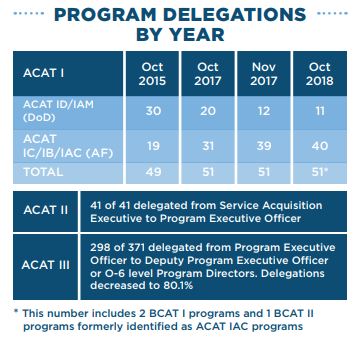Delegate Decision Authorities
SCO’s [DoD’s Strategic Capabilities Office] secret is fairly simple: empowering program managers with design tradespace, prototyping, flexible contracting, and appropriate decision authorities to take the reins of the programs. Resulting organizational byproducts—speed, agility, and accountability. If confirmed as the Air Force’s Senior Acquisition Executive, you can expect me to continue implementing Congressional intent by expanding this human-driven approach: delegating decisions to the lowest appropriate level; increasing rapid experimentation and prototyping for “fast failing”, early risk reduction, and keeping flawed concepts out of programs of record; and expanding use of commercial technology and practices, including designing for upgradeability and sustainment. From my experience, when acquisition professionals are given a clearly-articulated mission; design trade space; tools, like experimentation and prototyping, to explore it; rewards for speed and prudent risk-taking; and maximum decision authority over their programs, urgency, creativity, and accountability are natural byproducts.
Pushing decision authority to lower levels helps reduce decision latency and supports faster progress through the process. Empowering decision authorities at lower-tiers of the organization is thus a best practice and key enabler of acceleration.
Delegated decision-making is the preferred approach throughout acquisition policy guidance. DODI 5000.01, paragraph 4.3.5 states “Responsibility for the acquisition of systems shall be decentralized to the maximum extent practicable.” DoDI 5000.02, paragraph 5.4.e reaffirms that “Issues should be resolved at the lowest level possible.” Finally, FAR 35.0002 establishes a preference for “minimum administrative burden,” which in practice means reducing the number of decisions that require approval from higher authorities.
Empowering decision-making as close as possible to the sources of the most critical information reduces decision latency and enables the team to integrate more of the relevant data into the decision. A team that operates with the shortest possible decision-making path is more able to respond and adapt to rapidly changing conditions, move faster through its own decision-making process, and inform or implement decisions made higher in the organization. Allowing decisions to be made at lower tiers of the organization also frees up capacity for upper level leaders to take broader strategic actions and clear away the obstacles that degrade implementation. And most importantly, the individuals who are personally involved in decision-making take greater care throughout the process and feel greater ownership for the outcomes of the decision, making this a best practice and key enabler for acceleration. As a general principle, issues should be resolved at the lowest level possible.
Decision authority must be accepted as well as delegated. While senior leaders can initiate this change, personnel in lower-tier organizations must be willing to accept the accountability that accompanies empowerment. Both parties have a role in avoiding an overly cautious approach where all decisions are automatically pushed to the highest possible level.
Upon taking command, I delegated authority for 19 ACAT III and Services Category programs under $100 million, accounting for 37% of the
total PEO for Space portfolio, to SMC System Program Directors (SPDs). With this delegation, SPDs and their teams are now responsible for all facets of program execution, from milestone decisions to source selection and beyond. This delegation and other process improvement initiatives resulted in a reduction of acquisition timelines by 65% from the first acquisition event to contract award in FY16 through FY18. By reducing the amount of time it takes a program manager to reach a decision maker, SMC is not only saving time and taxpayer money, but also empowering the next generation of acquisition professionals.
For SMC’s larger programs, we have seen similar impacts from delegation of Milestone Decision Authority for Major Defense Acquisition Programs (MDAPs) from the DoD level to the Air Force level, allowing faster access to the decision maker. In 2017, the Under Secretary of Defense for Acquisition and Sustainment delegated authority for seven of nine major national security space programs to the Air Force. The Air Force is projected to accelerate the delivery of warfighting capabilities for these seven programs by an average of 24 months.
Actions You Can Take
- Review policy on decentralized decision authority and publicize local application for your project.
- As specifically as possible, identify decisions that can and should be delegated to lower levels.
- When in doubt, delegate. (Assuming no explicit statutory or regulatory policy preventing the delegation)
- Establish shared expectations about decision-making authorities.
- Continuously watch for instances where decision-making is slowed down by unnecessary involvement by higher-level authorities.
References
- Authority, Autonomy, Accountability, MITRE, Jun 2017
- Who Has the D?: How Clear Decision Roles Enhance Organizational Performance, Paul Rogers, Marcia Blenko, HBR, Jan 2006
- Untangling your organization’s decision making, McKinsey and Company, Jun 2017
- Decision Making the Empowerment Challenge, Daniel Kim
- 3 Ways to Improve Your Decision Making, Walter Frick, HBR, Jan 2018
- The New Realities, Peter Drucker, 1989
- The Solution Revolution, William Eggers, Paul Macmillan, 2013
- Understanding and Managing Public Organizations, Hal Rainey, 2003.
- The Strategic Corporal: Leadership in the Three Block War, Gen. Charles C. Krulak, Marines Magazine, Jan 1999
- Banishing Bureaucracy: Five Strategies for Reinventing Government, David Osborne and Peter Plastrik, 1997
- The End of Bureaucracy and the Rise of the Intelligent Organization, Gifford and Elizabeth Pinchot; 1993
- Reinventing Government: How the Entrepreneurial Spirit is Transforming the Public Sector, David Osborne and Ted Gaebler, 1993.

